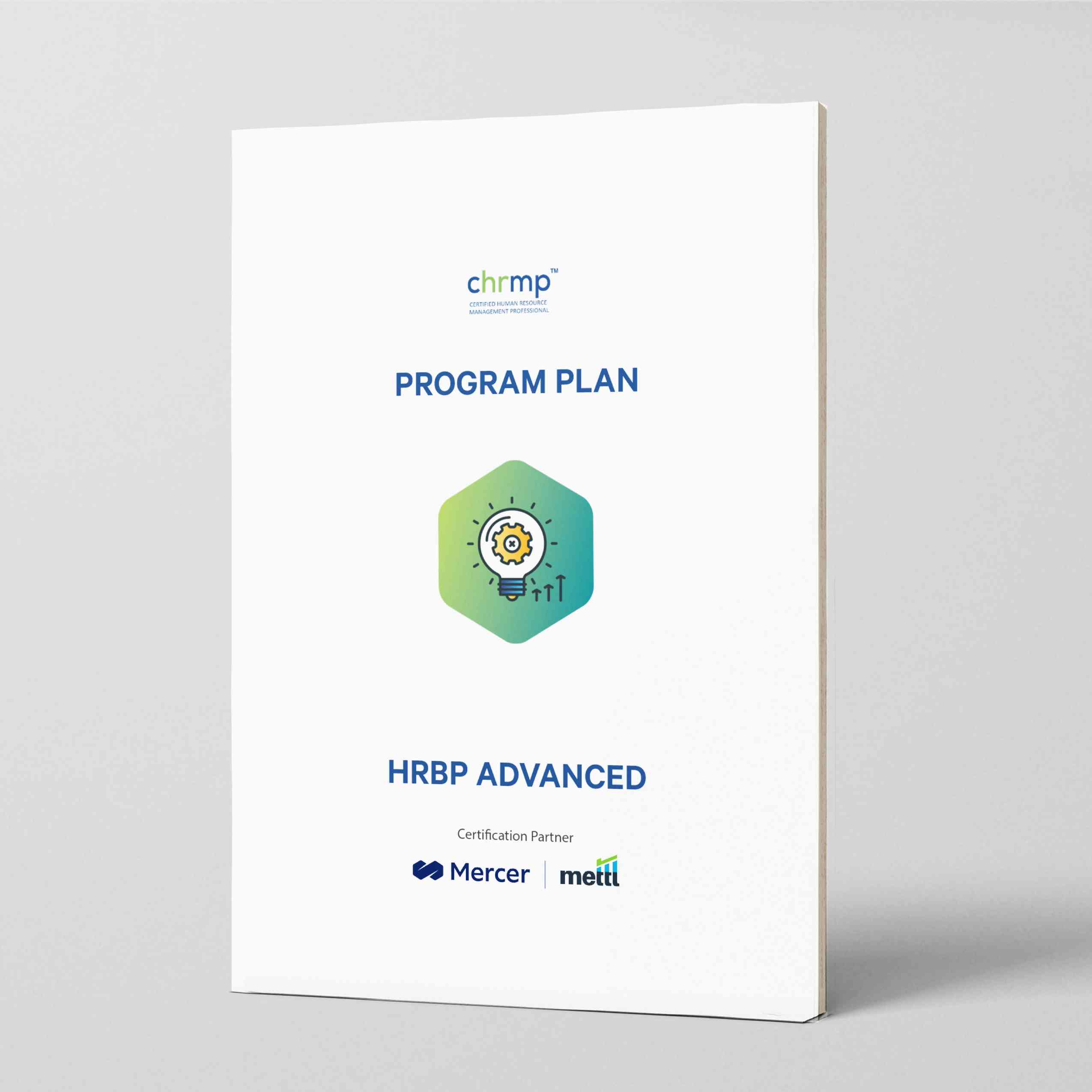HRBP Advanced certification equips you with strategic skills to align HR practices with business goals, enhancing organizational performance. This course dives into strategic workforce planning, talent management, and employee engagement, preparing you to tackle modern HR challenges innovatively. It’s designed for HR leaders aiming to influence and drive the HR strategy within their organizations.


The field of HR is dynamic, and we understand the importance of keeping up with the industry demands and expectations. As the world of work transforms and HR professionals lead their organisations through this time, they must continue to develop professionally. Earning your CHRMP certification demonstrates to your organization and future employers a serious commitment to the profession of HR. In the highly competitive and crowded job market, CHRMP helps you stay ahead.
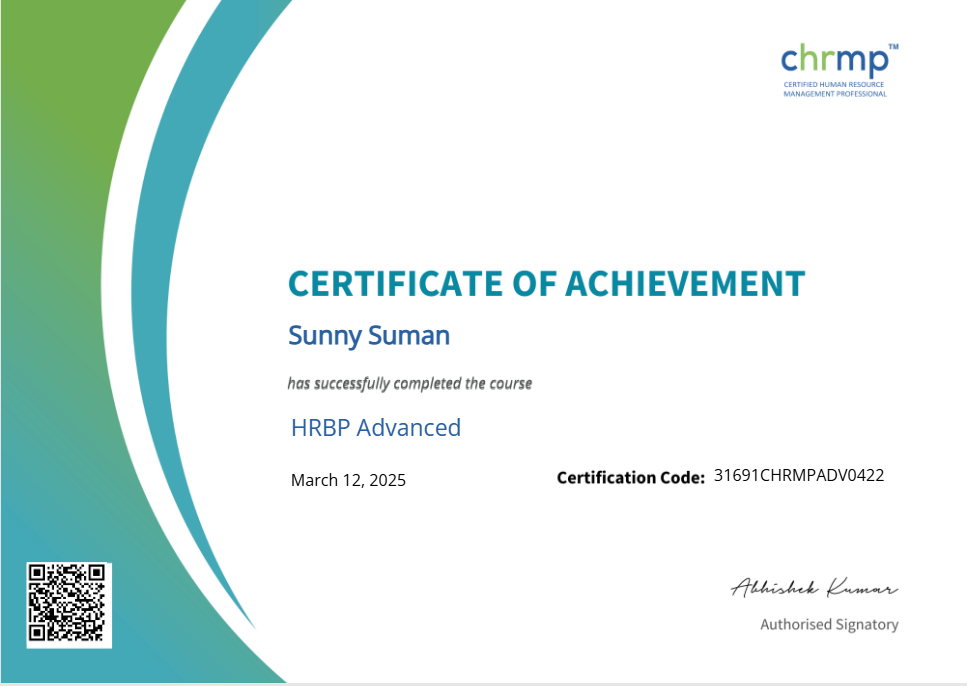
Mercer Mettl Validated CHRMP certification is highly acclaimed among HR professionals across the globe.
Receive Globally Recognized Blockchain Verified Certificate
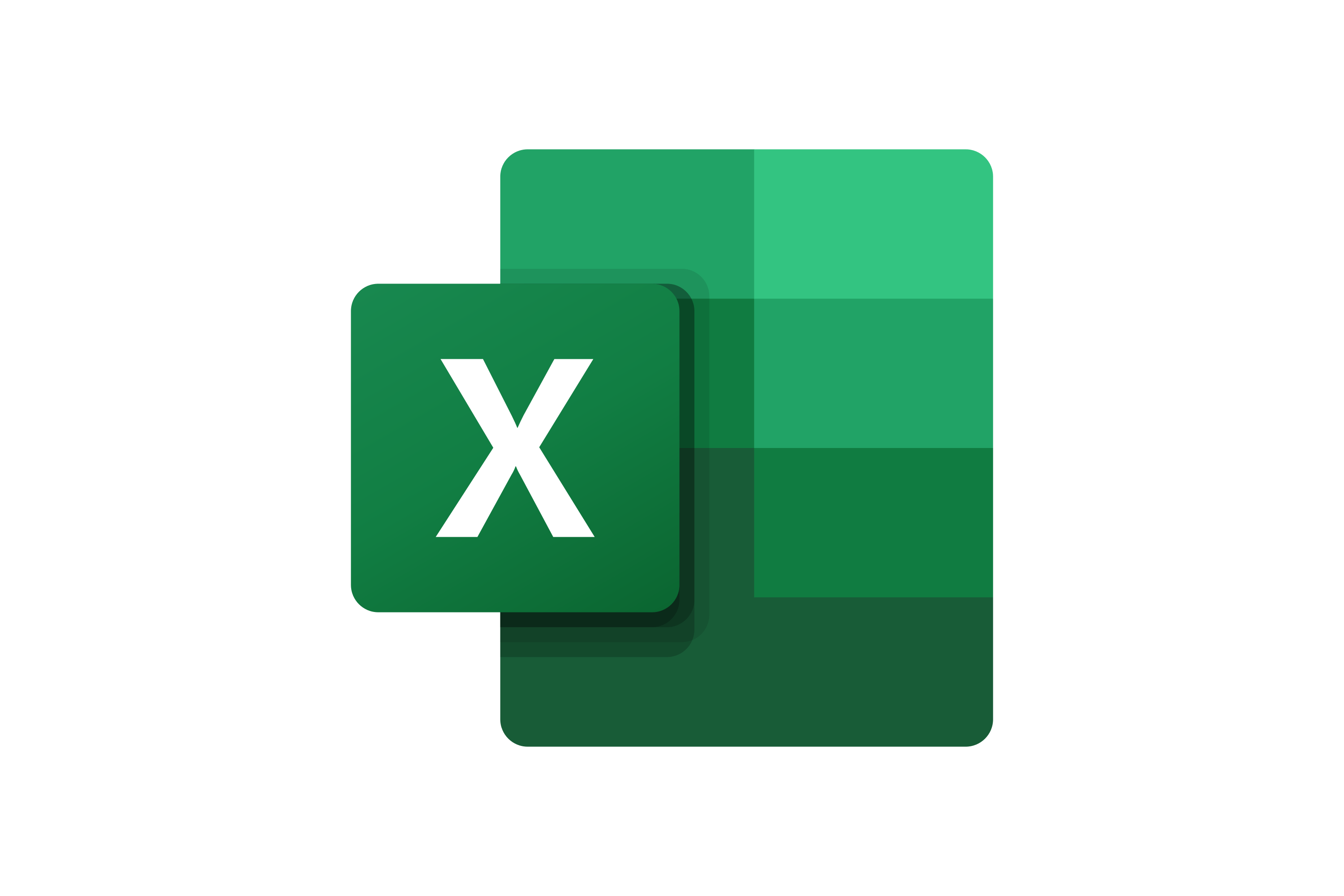

Abhishek Kumar is a consultant, speaker, writer and educator in the domain of Competency Development, Learning and Development, Talent Acquisition and Strategic Human Resource Management. Abhishek studies HR and Leadership practices and the broader areas of Competency Development and Assessment. Abhishek is the co-founder and CEO of Ripples Learning - an HR and L&D Consulting organization. Abhishek has been instrumental in creating the learning journey and certification framework for CHRMP....In the last 20 years of core HR consulting experience, Abhishek has advised more than 110 organizations, including Fortune 50 companies, Manufacturing Firms, SMBs, Startup-Unicorns, Banks, Governments and NGOs to create transformation at an individual, departmental or organizational level. Notable organizations that Abhishek has consulted with include Walmart, Accenture, Deloitte, Cognizant, Hewlett Packard, Franklin Templeton, Northern Trust, Airtel, Cap Gemini, Carl Zeiss, Cavin Care, ElasticRun, Freudenberg, Greenpeace, HDFC Life, Murata, Jubilant Biosys, Juniper Networks, Madura Fashions, Menzies Bobba, Monotype, Tata Consultancy Services, UID Project, Wipro, Volvo Eicher and many others. His body of work ranges from creating leadership learning journeys to transforming the talent acquisition process; from running assessment centers to implementing rigorous certification journeys in HR; and from competency mapping to setting up Performance Management Systems for achieving strategic organizational objectives. Abhishek is also the co-creator of ResultsLab, a breakthrough L&D tool which uses technology to enable Kolb’s Learning Cycle and measure training effectiveness at Kirkpatrick’s Level 3. Besides his work, Abhishek has a deep interest in psychology, science, history and philosophy.
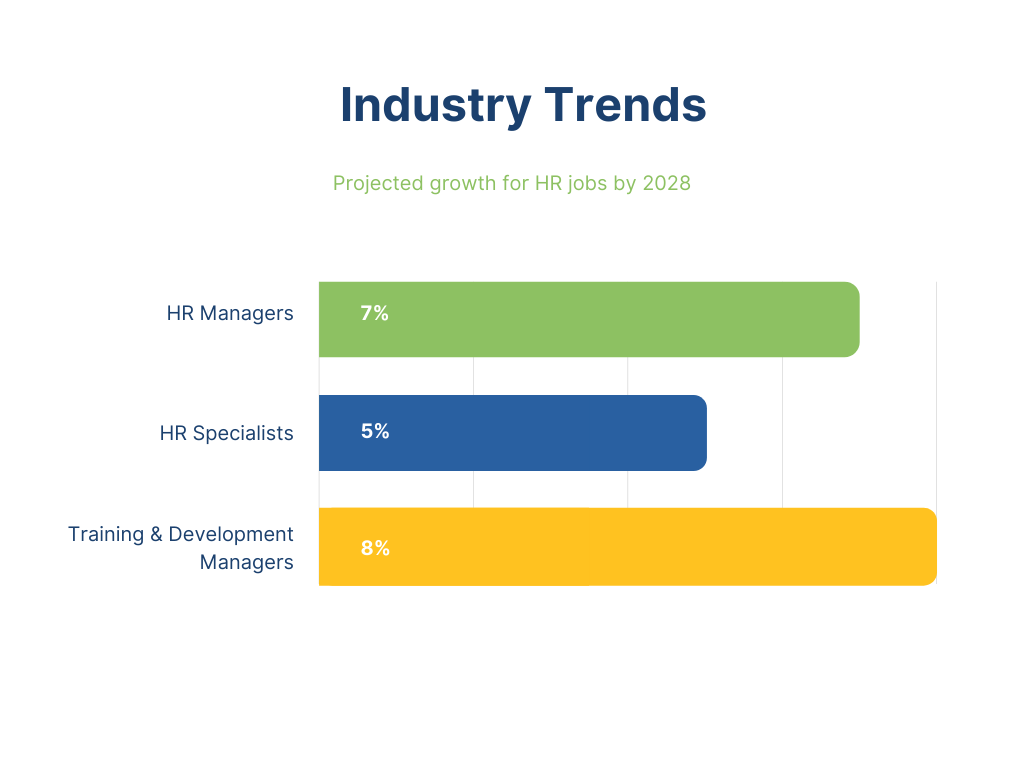
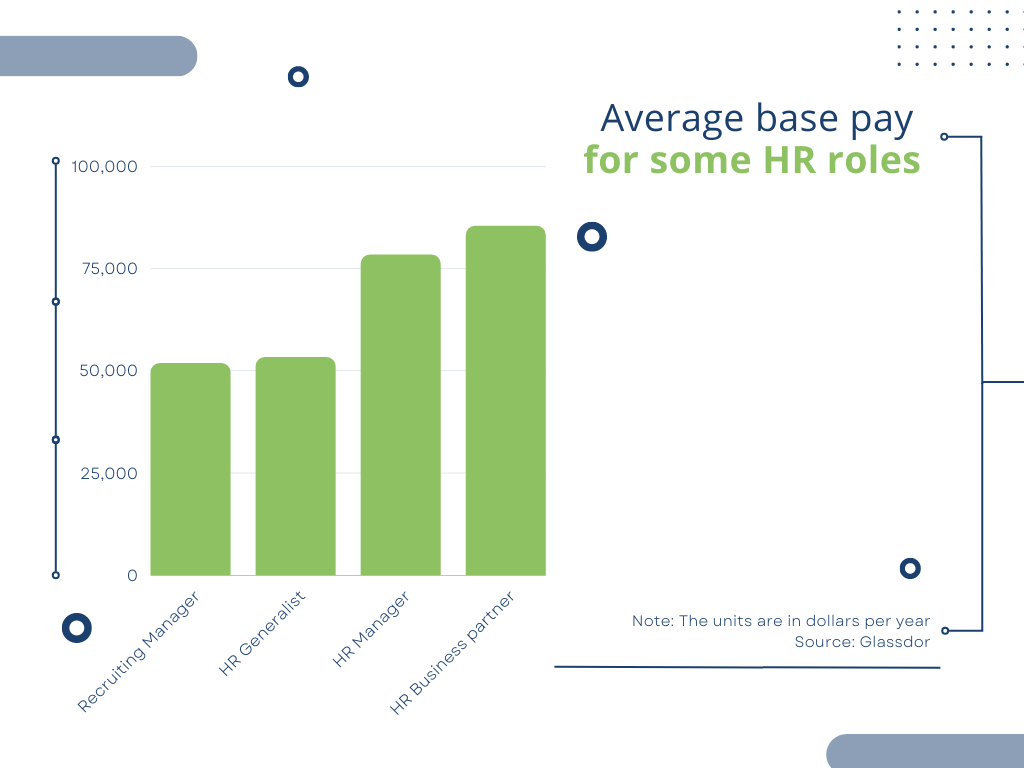

Prometric is the certification partner of CHRMP. As our certification partner, Prometric delivers one of the best testing standards in the world, offering a proctored, rigorous, and secure exam. Prometric is a global leader in competency assessment.

CHRMP certification is highly acclaimed in the HR domain worldwide, providing a recognized standard for professionals in the field. They are consultants to Fortune 500 companies, and the sessions conducted by them are aimed at developing competencies based on real-world challenges faced by HR professional.

The CHRMP Community spans across the globe. CHRMP exams can be taken from anywhere from the comfort of your home via web proctoring.

In association with Hyperstack, CHRMP provides certificates which are branded, secured, and verified through Blockchain Technology. These certificates can be shared and embedded on professional platforms such as LinkedIn. (View a Sample Digital Certificate)
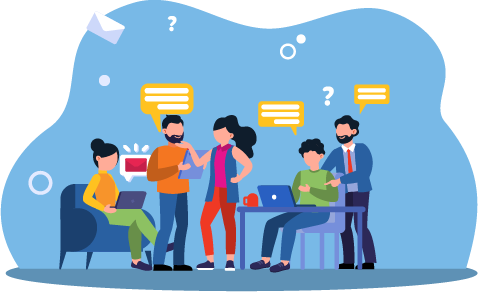
CHRMP prides itself on its growing HR Community, through which HR professionals can network, connect and collaborate with other professionals of the HR domain. This network acts as a vital resource, which results in opportunities and assistance.

Gain unlimited access to course resources for up to a year after registering. This acts as on-the-job assistance as well. The resources include an abundance of high quality 4K recordings with detailed explanation of the topics, making it an asset for CHRMP students and giving them an edge above the rest.
Build business-aligned HRBP capability through a practical certification pathway.
Become a data-driven HRBP - add analytics to sharpen decisions and impact.
Build a future-ready HRBP stack—Analytics + GenAI + Compliance mastery.

HRBP (HR Business Partner) Advanced certification is HR certification that strives to provide an overarching view of all the major domains of HR. The course covers all necessary areas ranging from major areas like Talent Acquisition and Stakeholder Management to subtle but important skills such as Excel, Presentation to trending areas such as HR Dashboard and HRMS.This certification enables HR professionals to develop strategies and tools across the various domains of HR that can make them adept and confident to further implement these tools and practices in the organization
The CHRMP HRBP Advanced certification program, is designed for HR Professionals aspiring to fast track their HR careers through cutting-edge applications. Therefore, candidates should already possess execution level knowledge of the HR domain and have relevant work experience. Those are prerequisites for earning this certification.
The eligibility criteria is set to ensure that participants are ready to meet the challenges and pace of the program.
If you fit any of the below criteria then the Advanced program is the right fit for you:
HRBP Advanced certification covers the 13 core modules and 7 additional modules. These are:
Core Modules:
Additional Modules:
The HRBP Advanced course is a blend of studio recorded, 4K quality Self Paced sessions and Online Bootcamps which are delivered by our trained facilitators. The pre-recorded lessons for self paced learning, available in the CHRMP Academy, comprises learning modules that you can complete at your own pace. These modules consist of videos, quizzes and additional resources that will make learning fun and help ensure that the concepts are as simple as possible to implement in real life situations.
The Online Bootcamps are live instructor-led sessions, conducted on Zoom – which have a mix of the most important concepts corroborated by in class activities, case discussions and projects.
However, it is not mandatory to attend the bootcamps in order to appear for the exam. You can choose to learn through either self paced, bootcamps or a combination of both depending on your learning style.
Self paced learning is one that happens as per one’s own convenience and comfort.
As part of the self paced learning, the participants have access to pre-recorded 4K quality videos of the different learning modules that are part of your certification program.You also get quizzes and courseware to reinforce your learning.
Online Bootcamps are instructor Led Sessions (ILT) delivered virtually. No, these are not webinars. These are interactive sessions where the participants and the facilitator interact with each other and learning takes place in a social environment These sessions have breakout rooms activities, case discussions and Q & As.
Online Bootcamps are conducted every Saturday from 1:30PM – 4:30PM IST.
The updated schedule is available in your Academy portal.
Go to “My Certification” > “HRBP” > “Online Bootcamp” to view the latest schedules.
You can access all the learning modules of your certification program for 6 months from the date of your enrollment into the course.
Yes, CHRMP is a competency based certification that is recognized globally by Fortune 500 companies. CHRMP certification is highly acclaimed, and certified professionals now hold distinguished positions in organizations across the globe in more than 50 countries.
Your CHRMP Academy account is created instantly, and login details are emailed to you. You’ll be added to the orientation WhatsApp group and you will receive an onboarding call from your dedicated point of contact within 24 hours.
The fees include access to the self-paced learning portal, online bootcamps, one attempt of the final web-proctored certification exam, and applicable taxes.
Our facilitators are subject matter experts who carry immense industry experience.
They have consulted top global organizations and have worked on setting up their HR processes like; Learning & Development, Employee Relations, Performance Management and Recruitment & Selection.
Yes, it is mandatory to appear as well as successfully clear the examination exam with 60% marks to get certified.
On successfully clearing your certification exam, you will receive your digital credentials which consists of a blockchain verified certificate and digital badge.
You can take the certification exam within 6 months of your enrollment. However, we recommend appearing within 4 months to maintain your learning momentum. You’ll receive more details about the examination window once you join the sessions.
You will get your certificate within 10 working days of successfully clearing your examination.
Yes, you will receive your result immediately after completing the exam. It will display the percentage you scored. If you score 60% or above, you have successfully cleared the exam. If your score is below 60%, you will need to reappear for the exam.
You can start in two ways:
self-paced or blended learning:
You can access all the modules of your certification program for 6 months from the date of your enrollment, even after you have cleared your certification exam within this time.
Online Bootcamps are conducted on Zoom.
In order to attend these sessions, the participants need to log into the CHRMP Academy and register in the “Online Bootcamps” section. Once you register with your email address, you will receive the session joining link on the same email ID.
Online Bootcamps are conducted to help the participants understand the practical application of the HR concepts. This is done through real time activities in breakout rooms and case discussions. These Boot Camps also enable the participants to clarify their doubts from the subject matter expert.

Fill in the below details to get a HRBP Advanced Program Plan.
